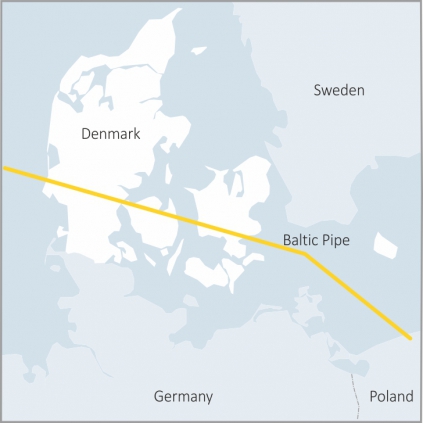Baltic Pipe Open Season Begins
_f336x237_1496910947.jpg) The pipeline project, which would provide both countries with direct access to Norway’s gas fields, is projected to be 600-800 km long, start operating by late 2022, cost kroner 12bn-16bn ($1.8bn-2.4bn), and have capacity of
The pipeline project, which would provide both countries with direct access to Norway’s gas fields, is projected to be 600-800 km long, start operating by late 2022, cost kroner 12bn-16bn ($1.8bn-2.4bn), and have capacity of
up to 10bn m³/yr (equivalent to four times Denmark's 2016 gas consumption).
Phase 1 of OSP 2017 started June 6; market participants will be able to respond no later than July 25 2017.
If the market participants submit phase 1 bids for a sufficient volume of capacity, TSOs will commence a fast track implementation of the Baltic Pipe Project in order to start the provision of gas transmission services from 1 October 2022.
Phase 2 of OSP 2017 is expected to start September 5th 2017 and require market participants to submit their final binding bids; the two developers are asking shippers to commit to 15-year capacity contracts.

Baltic Pipe's planned route (Map credit: Energinet)
Two information meetings are scheduled, one in Stavanger on June 20, another the next day at Energinet's office in Ballerup June 21. Energinet says its projected share of Baltic Pipe development costs is kroner 5bn-7bn depending on final technical solutions.
The project has already been accorded led 'Project of Common Interest' (PCI) status by the EU, so its construction cost could be grant-aided.
Poland's Gaz-System said the project could help integrate Danish-Swedish and Polish gas markets, which in turn could be linked by interconnectors planned to be built linking Poland to: Czech Republic, Slovakia, Ukraine, and longer-term Lithuania. These are part of the company's ambition to build over 2,000km of new gas lines by 2025, with Polish consumers expressing concern that they will end up paying for the massive programme.
Gaz-System has also said that connecting Baltic Pipe with Poland's LNG terminal in Swinoujscie could provide Denmark and Sweden with access to the global LNG market. Polskie LNG, a Gaz-System subsidiary, owns and operates the Swinoujscie terminal.
Mark Smedley



